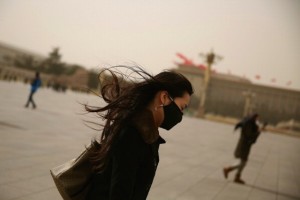Clean air is beneficial and necessary for human life, but much of the air we breathe in is not clean. Air pollution refers to the condition in which air contains a high concentration of harmful chemicals. The results of breathing such air cause disastrous public health fallouts that can range from chronic infections to lung cancer on a large population scale. This deadly pollution is caused by solid particles and poisonous gases in the air that is fatal to health, otherwise known as air pollutants, including carbon monoxide, oxides of nitrogen and sulfur dioxide.
In a normal exchange during respiration, clean air is breathed in, processing oxygen and releasing carbon dioxide. However, a large component of polluted air is carbon dioxide. Breathing polluted air is essentially breathing in the very gas your body is trying to eliminate through exhalation. Lungs are largely made up of exposed membrane. Thus, breathed in air is filtered through this membrane to the air sacs. It is in these air sacs that oxygen is exchanged with carbon dioxide which is then exhaled. When breathed in air is polluted, the oxygen that is sent throughout the body includes the toxins that polluted the air to begin with. These toxins begin breaking down cellular structures in the lungs and throughout your respiratory system, resulting in chronic respiratory distress.
Carbon monoxide reacts with hemoglobin to form carboxyhemoglobin. As a result, hemoglobin cannot transport oxygen to the rest of the body. It causes headaches, fatigue, breathing difficulties, as well as death. Nitrogen monoxide and nitrogen dioxide irritate the eyes and cause breathing difficulties by irritating the lungs. High levels of sulfur dioxide and oxides of nitrogen also lead to inflammation of the lungs.
These air pollutants are produced by the incomplete combustion of carbon-contaminating fuels. For example, much of the carbon monoxide in the air comes from the incomplete combustion of petrol in car engines; oxides of nitrogen (NO, NO2) are produced in a car engine or car factory, where high temperatures facilitate nitrogen combining with oxygen in the air to form nitrogen monoxide; the major source of sulfur dioxide is the combustion of fossil duels such as coal, crude oil (petroleum) and natural gas.
Manufacturing industries in Beijing as well as city’s 5 million-plus cars all contribute to the city’s crippling air pollution, but most experts primarily blame the coal-burning electrical plants that power China’s economic growth. China now burns 47 percent of the world’s coal, roughly equal to the amount used by all other countries of the world combined.
Jackie Liu, an 18 year old high school senior in Beijing, writes in an email interview “I have had asthma since I was a little girl so I am especially affected by the severe air pollution in Beijing. I have lived here my entire life and I love my country. However the pollution gets so thick and overwhelming…I think the pollution in Beijing is the reason I have to make so many pills and medicines to recover from my chronic disease of emphysema [a chronic disease that results in the narrowing of the airways and breakdown of lung tissue] as well as my bad acne. There are many days that I choose to stay inside my home rather than go outside [for the sake of my health].”
According to the 2010 Global Burden of Disease Study, in China air pollution contributed to 1.2 million premature deaths in 2010, which is nearly 40 percent of the global total. Figured another way, the researchers said, China’s toll from pollution was the loss of 25 million healthy years of life from the population.
Calculations of premature deaths because of outdoor air pollution are politically threatening in the eyes of some Chinese officials. Even as the Chinese government insists that it is working overtime to address the pollution crisis, officials are busy covering up and censoring media. According to employees, an editor at the Finance Channel (a news media outlet in China) was fired for posting offending microblog posts about the severity of the pollution in China; the Finance Channel was banned from all reporting on Beijing’s smog, because, they said, the posts infuriated the city’s mayor, Wang Anshun. Garlic Liu a 20-year-old college student studying abroad in Columbia University who is also a native to Beijing said in an interview, “Hey, I love China. But there is no denying that the truth is there are a lot of things wrong with the government. The Chinese people love their country but I believe China doesn’t love its people.”